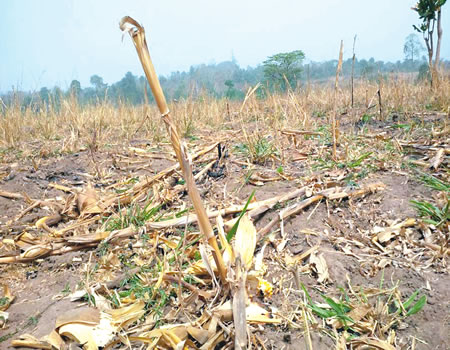Not even the elite farmers in the country are exempt from the wanton and wilful destruction orchestrated by the herdsmen: the farms of a former Secretary to the Government of the Federation and traditional ruler, Chief Olu Falae and a former Chief of Naval Staff, Admiral Samuel Afolayan, have been invaded many times. They both have sad tales to tell about the serial fires set to their farms by the herdsmen in a bid to make their herds to forage on the fresh and tender, sprouting tendrils after the fires. The farmers in Benue State, known for their prolific production of food crops like yams, have similarly been frightened off their farms in the wake of the violent massacre of their compatriots. And farmers elsewhere also share the fears of their Benue State compatriots. Farming has become a risky and life-threatening venture.
For instance, recently, some herdsmen allegedly burnt down a 120-acre farmland in a farm settlement in the Esa-Oke area of Osun State. According to media reports, the farmland had plantain, oil palm, mangoes and other economic trees planted there by farmers. In yet another incident, the herdsmen killed a farmer in Ekiti State while he was returning home from his farm. In the absence of any official rebuke of the aggression of the herdsmen, it would be foolhardy and suicidal for any farmer to continue tilling the land in the presence of the violent and murderous nomads. So, apart from the infamy which the Fulani herdsmen’s violent invasions represent, they have also become an official signal for impending food shortage in the coming harvest season. If the county’s farmers have been displaced from their farms now, it will be silly to expect any bounteous harvest from them. As a matter of fact, Benue yam farmers have reportedly issued a notice to Nigerians not to expect a bountiful harvest this year.
For a country that is, in the main, dependent on crude forms of farming for food security, it is bothersome that the authorities have yet to find it imperative to address this issue, especially as the threats and invasions of the herdsmen seem to have their official endorsement. The president, in the name of the statutory duties of the establishment which he heads, should be concerned with what this portends for national food security and therefore address the issue honestly. Why have the security agencies, statutorily under the executive arm of the government, been so hesitant in arresting the herdsmen? Could it be because of their ethnically unbalanced composition?
What will become of the livelihoods of the affected farmers after they have been displaced by the marauding herdsmen? Are there plans to compensate and rehabilitate them? What steps are being taken to cushion the effects of the impending food shortage that is so assured? What plans are in place to bring down the prices of food items during the food shortages? Will the consumers bear the brunt exclusively? There must, we insist, be a plan to address the issue of food shortage that is expected following the breach of security which the nefarious activities of the herdsmen have constituted and the president should consider himself obliged to assure the country. We expect him to be proactive in these matters as they touch on the existence of those who have fortuitously remained alive despite the rampage and infamy of the herdsmen.






